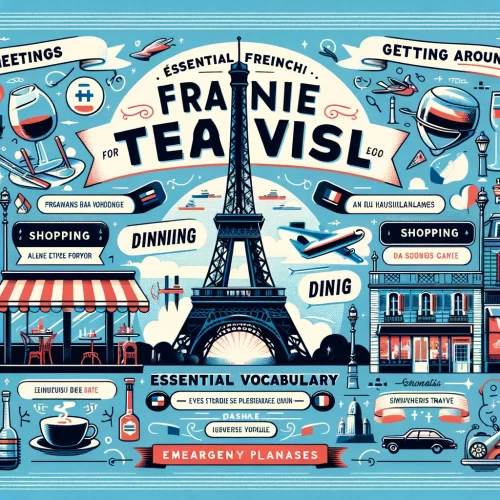Traveling to France is a dream for many. From the breathtaking Eiffel Tower and the scenic countryside of Provence to the world-class art museums and the sunny French Riviera, France is a place filled with iconic landmarks, culture, and cuisine. Although many French people do speak English, learning essential French vocabulary can enhance your travel experience. A few phrases can help you navigate, connect with locals, and show respect for French culture. This guide provides essential French vocabulary for travelers to help you blend in and communicate smoothly on your journey.
1. Basic Greetings
First impressions matter! Starting conversations with polite greetings can help set the right tone when interacting with locals. Here are some key phrases:
- Bonjour (bohn-zhoor) – Good morning/Hello
- Bonsoir (bohn-swahr) – Good evening
- Salut (sah-loo) – Hi (informal)
- Merci (mehr-see) – Thank you
- S’il vous plaît (seel voo pleh) – Please
- Au revoir (oh ruh-vwar) – Goodbye
- Pardon (par-don) – Excuse me (to get someone’s attention)
Politeness is highly valued in French culture, so it’s essential to use phrases like Merci (thank you) and S’il vous plaît (please) as often as possible.
2. Getting Around
France has an extensive public transportation system, and knowing a few key phrases can make getting around much easier. Whether you’re in Paris or exploring smaller towns, these words will come in handy:
- Où est… ? (oo eh) – Where is…?
- La gare (lah gar) – The train station
- Le métro (luh meh-troh) – The metro
- Un billet (un bee-yay) – A ticket
- Combien coûte… ? (kohm-byehn coot) – How much does… cost?
- Aéroport (ay-eh-roh-por) – Airport
- À pied (ah pee-ay) – By foot/walking
- En bus/train/taxi (on bus/train/taxi) – By bus/train/taxi
In bigger cities, it’s common to ask, “Où est la station de métro ?” (Where is the metro station?) or “Un billet pour Paris, s’il vous plaît” (One ticket to Paris, please). It’s always a good idea to confirm the fare by asking, “Combien coûte…?”
3. At the Hotel
Checking in at a hotel is a common interaction, and having some vocabulary specific to accommodation can make things smoother. Here are some useful terms:
- Réservation (ray-zair-vah-syon) – Reservation
- Chambre (shawm-bruh) – Room
- Clé (kleh) – Key
- Ascenseur (ah-san-sur) – Elevator
- Salle de bain (sal duh ban) – Bathroom
- Petit-déjeuner (puh-tee day-zhuh-nay) – Breakfast
- Wi-Fi (wee-fee) – Wi-Fi
When arriving, you might say, “Bonjour, j’ai une réservation” (Hello, I have a reservation) or ask, “Où est l’ascenseur ?” (Where is the elevator?) if needed.
4. Dining Out
French cuisine is famous worldwide, and dining is an essential part of the French experience. Knowing a few restaurant-specific phrases can help you enjoy your meals like a local:
- Une table pour deux, s’il vous plaît (oon tah-bluh poor duh, seel voo pleh) – A table for two, please
- La carte/le menu (lah kart/luh meh-new) – The menu
- L’addition, s’il vous plaît (lad-ee-syon, seel voo pleh) – The bill, please
- Vin rouge/blanc (vin roozh/blon) – Red/white wine
- Plat du jour (pla dy zhoor) – Dish of the day
- Eau (oh) – Water
- Sans glace (sanz glahs) – Without ice
It’s polite to start by saying, “Bonjour, une table pour deux, s’il vous plaît” to request a table. When you’re finished, ask for the bill by saying, “L’addition, s’il vous plaît.”
5. Shopping
From the boutiques of Paris to open-air markets, France is a shopper’s paradise. Here are some words and phrases to use while shopping:
- Combien ça coûte ? (kohm-byehn sah coot) – How much does it cost?
- Je voudrais… (zhuh voo-dray) – I would like…
- C’est trop cher (say tro shayr) – It’s too expensive
- Un souvenir (uhn soo-vehn-eer) – A souvenir
- Carte de crédit (kart duh kray-dee) – Credit card
- Espèces (es-pess) – Cash
- Sac (sak) – Bag
When you find something you like, try “Je voudrais acheter…” (I would like to buy…) or ask, “Est-ce que vous acceptez les cartes de crédit ?” (Do you accept credit cards?).
6. Emergency Phrases
Safety is essential, and while we hope for a smooth trip, it’s best to be prepared. Here are some crucial phrases for emergencies:
- Aidez-moi ! (ay-day mwah) – Help me!
- Je suis perdu(e) (zhuh swee pair-doo) – I am lost
- Appelez un docteur ! (ah-puh-lay uhn dok-tur) – Call a doctor!
- Urgence (ur-zhahnce) – Emergency
- Pharmacie (far-mah-see) – Pharmacy
- Où est l’hôpital ? (oo eh lo-pee-tal) – Where is the hospital?
- Police (poh-lees) – Police
If you ever need assistance, don’t hesitate to use “Aidez-moi !” or “Appelez un docteur !” if there’s a medical emergency.
7. Common Expressions
Some everyday expressions are useful for general conversations, and you might hear them often. Here are a few:
- Ça va ? (sah vah) – How are you?
- Oui/non (wee/non) – Yes/no
- Peut-être (puh-teht) – Maybe
- Excusez-moi (ehk-skew-zay mwah) – Excuse me
- Je ne comprends pas (zhuh nuh kohm-prah pah) – I don’t understand
Using these phrases, such as “Excusez-moi” when you need help, will go a long way in making a good impression.
Learning essential French vocabulary before your trip will help you feel more confident and allow you to connect with French people in a meaningful way. Embrace the experience, and remember that a few phrases in French can lead to a warmer welcome. Bon voyage!


